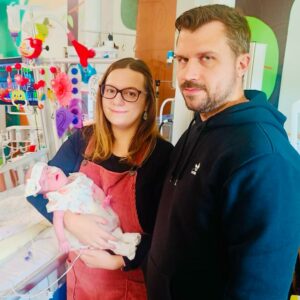Robyn's story
Nine-month old Robyn born seventeen weeks and five days early in March this year. Her mum, Chantelle, took a break from work for her 20 week scan and never returned. She’s hardly been home since either. Chantelle’s pregnancy had been trouble free up to that point, so it came as a complete shock when the scan revealed that her membrane was bulging – a sign of early labour. She was admitted to the Grange in Newport and put on bed rest.
Just three weeks and two days later, Chantelle’s waters broke. During labour, baby Robyn got stuck in the birth canal for six minutes. Because she was so small, it was impossible for the clinical team to intervene. Her brain was deprived of oxygen and the baby, whose odds of survival were against her already, was also born with brain damage. Robyn entered the world weighing a tiny 328g, a third of a bag of sugar. She was the smallest baby in Wales at the time.
Chantelle said: “She could fit in the palm of your hand. The birth was a really traumatic experience and we didn’t know if she would make it. A team of around 20 people were ready and waiting to intubate Robyn at the bedside, before she was whisked away to the neonatal intensive care unit (NICU).
During the time baby Robyn spent on NICU, she encountered countless hurdles and proceedures, including 16 blood transfusions. Robyn’s veins were to tiny that they were often to difficult to access. But the most terrifying complication for Chantelle and Daniel was the fact that Robyn would frequently stop breathing. Each time the new parents had to watch helplessly as the crash team rushed in to resuscitate her.
After seven and a half months in NICU at the Grange, Robyn was transferred to the Noah’s Ark Children’s Hospital for Wales for a sleep study. The study showed that Robyn had severe case of obstructive sleep apnoea, where the throat muscles relax and block the airway causing an obstruction. She also had central sleep apnoea where there are pauses in breathing and the body does not attempt to breathe.
In most cases, the problem can be managed effectively with the use of oxygen overnight or a continuous form of non-invasive ventilation called CPAP. But even with this support, Robyn often needs to be resuscitated after a severe episode, sometimes up to ten times in one day.
Chantelle says: “I genuinely don’t know if every breath is going to be the last breath. The minute where she stops breathing feels like an hour. My husband Daniel and I take 12-hour shifts so that Robyn always has someone with her. I take the day shift and Daniel takes the night shift, which means we see each other for half an hour for handover and then swap.”
Robyn is now nine-months-old, and is making slight improvements. Her clinical team are currently deciding whether surgery to correct the obstruction in Robyn’s airway might be an option. But despite this, Chantelle and Daniel know that they’ll likely spend their first Christmas as a family of three on the paediatric critical care unit. Determined to still celebrate their daughter’s firsts, Chantelle and Daniel have decorated Robyn’s cot with garlands and lights in preparation for her first Christmas. Chantelle loves to read stories to Robyn and her favourite is Guess How Much I Love You by Sam McBratney. Robyn loves baby massage to help to relieve the dystonia which causes muscular spasms in her calves.
Chantelle says: “Rightly so, the doctors and nurses are here for Robyn’s medical care, so to have the opportunity to speak to someone independent, who is there solely for me would be a massive help. I think being able to process the last few months would benefit me so much. I went to my 20-week scan on a break from work and never went back. All I’ve known since is the inside of a hospital.”










